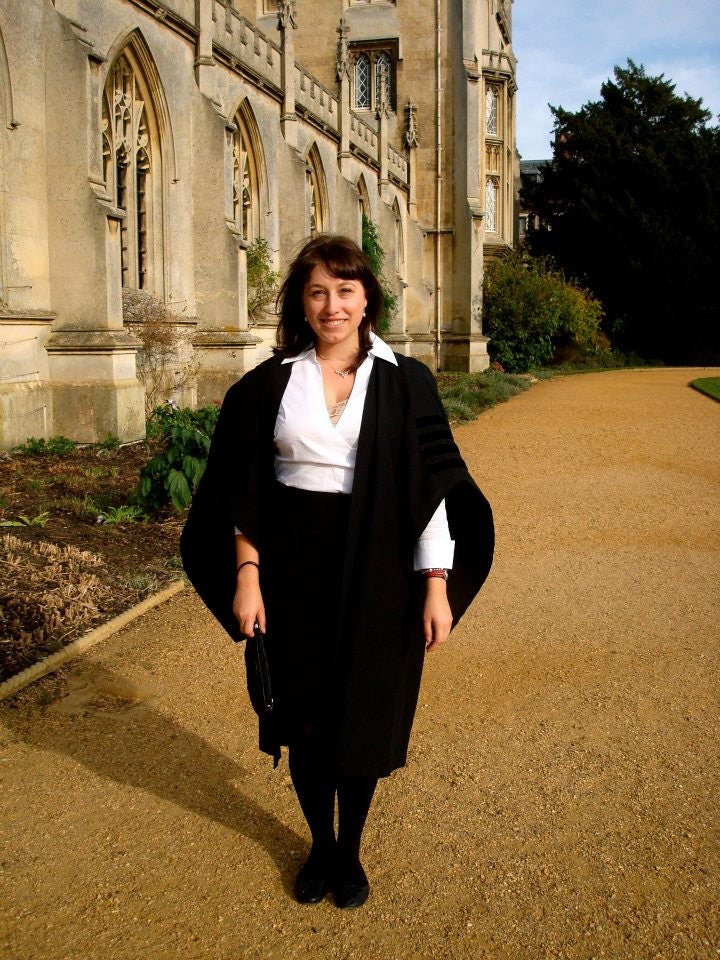What's it like being at Cambridge as an American student?
Deanie Vallone was catapulted from a small American college into studies at Cambridge. It was a culture shock alright - but a positive one

Your support helps us to tell the story
From reproductive rights to climate change to Big Tech, The Independent is on the ground when the story is developing. Whether it's investigating the financials of Elon Musk's pro-Trump PAC or producing our latest documentary, 'The A Word', which shines a light on the American women fighting for reproductive rights, we know how important it is to parse out the facts from the messaging.
At such a critical moment in US history, we need reporters on the ground. Your donation allows us to keep sending journalists to speak to both sides of the story.
The Independent is trusted by Americans across the entire political spectrum. And unlike many other quality news outlets, we choose not to lock Americans out of our reporting and analysis with paywalls. We believe quality journalism should be available to everyone, paid for by those who can afford it.
Your support makes all the difference.As a child I dreamt of being a blend of Hermione Granger and TS Eliot, a girl who found her true home studying at a mythical school in England. But much like winning the lottery or receiving an acceptance letter from Hogwarts, the idea of a Midwestern girl going to Oxbridge seemed like a pipe dream.
Then came the Davies-Jackson Scholarship, a privately funded scholarship administered by the Council of Independent Colleges. The scholarship gives first-generation American students (i.e. the first in their family to go to university) the opportunity to study at St. John's College, Cambridge. Selection for the scholarship focuses on writing ability, requiring several extensive essays. Candidates must also demonstrate high academic performance and independent thinking.
Being a first-generation student, I placed a lot pressure on myself. Yet throughout my studies, I've never been alone. There was always a professor helping me edit my Cambridge application or friends cheering me on. Thus it was only fitting that my mother read me my Cambridge acceptance letter over the phone while I stood in a Florida airport. I had three good friends standing next to me to hear the news as soon as I got off the phone.
Since that tumultuous moment over two years have passed in which I've lived in the UK. What surprised me the most is how easily I adjusted to the UK.
Despite some significant differences - chips vs. crisps vs. fries, driving on the 'wrong' side of the road, Marmite? - I was still living in a university town, surrounded by students (and a whole lot of Americans).
The most exhilarating aspect of attending Cambridge was finding young people who were just as passionate as myself. This is not to say US students aren't highly motivated, but Cambridge collects them and puts them in one small town.
Intimidating
I would be lying if I said it wasn't intimidating. A lot of us students that arrive at Cambridge were at the top of our class. Suddenly we're in a lecture hall crammed full of these star students. This kind of environment makes for tough competition, and failing to be the absolute best can be a difficult reality to face. Despite what appears to be a harsh environment, my fellow students have been nothing but encouraging and accepting.
I believe this competitive but generous mentality stems from the fact that majority of the students are in love with their work. None of us would be here if there wasn't a fire driving us to hunt down obscure textbooks, or to attend morning lectures (despite having been at a club the night before).
Though Cambridge is founded on academic work, it would not be the concrete entity it is without its traditions. Having attended one of the largest and perhaps most traditional colleges, I had the full experience. This was a carnival for my child self.
Picture massive candlelit dining halls, billowing black gowns, glamorous balls, boat races, Latin prayers, and Christmas dinners with crackers (what a novelty!). Elements such as these made Cambridge a home, not just a glorified classroom.
Living a dream
For so many, Oxbridge is a story in a newspaper, a Wikipedia article, even a pipe dream, as it used to be for me. Living this dream for two years has made me realise that despite its ancient eccentricities, Cambridge can be just a normal place. Some nights it is just down-to-earth students eating Super Noodles as they rush to type up an essay due the next morning - not terribly different from my undergraduate university in the US.
My time at Cambridge has provided me so much more than a line on a CV. I discovered the Cambridge theatre scene and found my true calling. I travelled to countries I never thought I would. Through travel grants offered by St. John's, I trained birds of prey in Ireland. I published a short story in a literary magazine, interviewed Neil Gaiman for an international film festival, finally figured out the Underground, and met extraordinary people. None of this would have been possible without the help of both the Davies-Jackson Scholarship and St. John's College.
This summer I will be returning home to the States. While I love the US, England has become my home these past years. I know now that I could live here the rest of my life, much like Mr. Eliot, and be entirely happy. I have become T.S. Granger or Hermione Eliot, the hybrid-girl I always hoped I'd be. Though I have no immediate plans to come back to the UK, I know I will very soon. My life has been changed utterly by this place and I'm not about to let it go.
Deanie Vallone is a recent Davies-Jackson scholar
Join our commenting forum
Join thought-provoking conversations, follow other Independent readers and see their replies
Comments